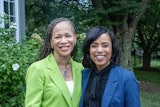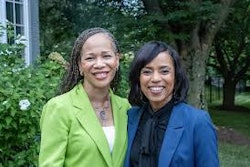Growing up in Hyderabad, Pakistan, Dr. Shenila Khoja-Moolji received a scholarship from the United World Colleges as part of the International Baccalaureate Diploma Program in the United States.
After earning degrees from Brown University, Harvard University and Columbia University, she went on to become a postdoctoral scholar at the University of Pennsylvania.
 Dr. Shenila Khoja-Moolji
Dr. Shenila Khoja-MooljiThat passion for research stemmed from Khoja-Moolji’s “ethical commitment to cultivating a more just and pluralistic world.”
Shortly after completing the program in 2018, she was offered a faculty position at Bowdoin College.
“Bowdoin has been a particularly hospitable home for me as it emphasizes excellence in both research and teaching,” says Khoja-Moolji, assistant professor of gender, sexuality and women’s studies at Bowdoin. “I therefore feel extremely supported by the institution.”
The field of gender, sexuality and women’s studies provides Khoja-Moolji with an opportunity to “examine political and social problems through multiple lenses utilizing a broad range of research methodologies.”
In the classroom, Khoja-Moolji describes diversity as being a “fact of life” and looks at it through the lens of “inquiry, critique and healing.”
“I historicize difference, interrogate its production and entanglements, ponder over its usefulness, as well as highlight how it can fuel violence,” she says. “The particular social constructions and structural practices that I am both animated and puzzled by are gender, race, class, religion, sexuality and ability. In my classrooms, I welcome deep thinking around both the social uses of diversity and its politics.”
She has continued to enjoy holding discussions with her students on ways to address societal issues and develop an “ethical disposition.”
This semester, Khoja-Moolji’s courses focus on the areas of religion, politics and gender in Pakistan as well as the process behind gender research.
“Students at Bowdoin are a joy to teach,” she says. “They are curious, diligent and critical thinkers.”
As an interdisciplinary scholar, Khoja-Moolji’s research focuses on past and present violence against Muslim women, the history of Ismaili Muslim women, masculinity and Muslim girlhood.
“This has taken me on journeys where I have explored multiple regimes of knowledge-power — from human rights and girls’ education to national security … from Pakistan and Uganda, to the U.S. and Canada — that both constrain and offer opportunities to Muslim women,” she says.
Khoja-Moolji’s work has been featured in publications such as Feminist Theory; Signs: Journal of Women in Culture and Society; Gender and Education; Comparative Studies of South Asia, Africa and the Middle East; and Feminist Media Studies.
In addition to journal publications, she has also authored two books.
The first, Forging the Ideal Educated Girl: The Production of Desirable Subjects in Muslim South Asia, was published in 2018 and looks at the ever-changing landscape of educational reform in both Pakistan and India.
Set to be published in July, Khoja-Moolji’s second book, Sovereign Attachments: Masculinity, Muslimness, and Affective Politics in Pakistan, conveys the social and political external factors that affect the conditions of Muslim women.
“I examine how women get caught in expressions of sovereignty by state and non-state actors, and its affective reverberations within common publics,” she says. “The book advances our understanding of political attachments as contingent and interacting with gender and religion.”
Through the use of oral history, interviews and archival research, Khoja-Moolji is currently developing a third book which highlights the “religio-moral lifeworlds of Ismaili Muslim women who were displaced from Uganda and East Pakistan.”
“As Shia, these women belong to a minority that constitutes less than 10% of the world’s Muslims,” she says. “And as refugees, they are often unwelcome and pathologized as a drain on the resources of the host country. They are thus [doubly] marginalized.”
Over the years, Khoja-Moolji has attained a number of accolades including the Best Field-Based Initiative Award by the Comparative and International Education Society and the Brown University Book Award. She was also selected to participate in the Women of Color Leadership Project as part of the National Women’s Studies Association.
Khoja-Moolji’s journey into the higher education sector was difficult to attain without the support of her family and the Ismaili Muslim community.
Even now, her parents’ influence is seen within the classroom as she attempts to follow their practice of Shi’i Muslim’s “ethics of service and generosity.”
“My parents have served as my role models throughout my career,” Khoja-Moolji adds.
In the future, she wants to continue researching, writing and teaching ways to “cultivate more caring life worlds and capacious forms of living.”
This article originally appeared in the March 4, 2021 edition of Diverse. Read it here.















